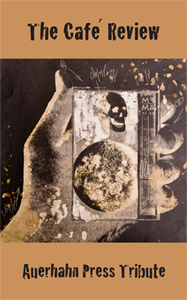John Wieners

January 6, 1934 – March 1, 2002. Born in Milton, Massachusetts, he studied at Boston College. In 1954 he heard Charles Olson read at the Charles Street Meeting House on Beacon Hill, and thereby, decided to enroll at Black Mountain College where he studied under Olson and Robert Duncan from 1955 to 1956. He then worked as an actor and stage manager at the Poet’s Theater in Cambridge, and began to edit Measure, releasing three issues over the next several years. From 1958 to 1960 he lived in San Francisco, California and actively participated in the San Francisco Poetry Renaissance. The Hotel Wentley Poems was published in 1958, when he was twenty – four. His second book, Ace of Pentacles, was published in 1964. In the spring of 1969, he was institutionalized for the second time, and wrote Asylum Poems. Nerves was released in 1970, containing work from 1966 to 1970. In 1975, Behind the State Capitol or Cincinnati Pike was published, a magnum opus of “Cinema decoupages; verses, abbreviated prose insights.” In 1985, he was a Guggenheim Fellow. Black Sparrow Press released two collections: Selected Poems: 1958 –1984 and Cultural Affairs in Boston, in 1986 and 1988 respectively. He died on March 1, 2002 at Massachusetts General Hospital. Kidnap Notes Next, a collection of poems and journal entries was published, posthumously, in 2002. A Book of Prophecies was published in 2007 from Bootstrap Press. The manuscript was discovered in the Kent State University archive’s collection by poet Michael Carr. It was a journal written by Wieners in 1971, and opens with a poem titled 2007.
Philip Whalen

October 20, 1923 – June 26, 2002. He was born in Portland, Oregon and attended Reed College on the GI Bill, receiving a B.A. in 1951. He and Gary Snyder were roommates in college and both were readers at the Six Gallery on October 7, 1955. His poetry books include, Self Portrait from Another Direction, Auerhahn Press, San Francisco 1959; Memoirs of an Interglacial Age, Auerhahn Press, San Francisco 1960; Heavy Breathing: Poems, 1967 – 1980, Grey Fox Press, San Francisco 1983; Canoeing up Cabarga Creek: Buddhist Poems 1955 – 1986, Parallax Press, Berkeley 1996; and The Collected Poems of Philip Whalen, Wesleyan University Press, 2007. He spent 1966 and 1967 in Kyoto, Japan, assisted by a grant from the American Academy of Arts and Letters. There, he practiced zazen daily, and wrote some forty poems and a second novel. He moved into the San Francisco Zen Center and became a student of Zentatsu Richard Baker in 1972. He was ordained a Zen Buddhist priest in 1973 and became head monk, Dharma Sangha, in Santa Fe, New Mexico in 1984. In 1987, he received transmission from Baker, and in 1991, he returned to San Francisco to lead the Hartford Street Zen Center until forced by ill health to retire.
Jack Spicer

January 30, 1925 – August 17, 1965, was an American poet often identified with the San Francisco Renaissance. In 2009, My Vocabulary Did This to Me: The Collected Poetry of Jack Spicer won the American Book Award for poetry. He spent most of his writing – life in San Francisco and spent the years 1945 to 1955 at the University of California, Berkeley, where he began writing, doing work as a research – linguist, and publishing poetry. Through his alliance with Robert Duncan and Robin Blaser he forged a new kind of poetry, and together they referred to their common work as the Berkeley Renaissance. His poetry of this period is collected in One Night Stand and Other Poems (1980). In 1954, he co – founded the Six Gallery in San Francisco, which soon became famous as the scene of the October 1955 Six Gallery reading that launched the West Coast Beat movement. In 1956, he began working on After Lorca, during which he began to practice what he called “poetry as dictation.” As such, he is acknowledged as a precursor and early inspiration for the Language poets. He died as a result of alcoholism. Since the posthumous publication of The Collected Books of Jack Spicer (first published in 1975), his popularity and influence has steadily risen, affecting poetry throughout the United States, Canada, and Europe. In 1994, The Tower of Babel: Jack Spicer’s Detective Novel was published. A biography, Jack Spicer and the San Francisco Renaissance by Lewis Ellingham and Kevin Killian (Hanover, New Hamphire, Wesleyan University Press,) was published in 1998.
Irving Rosenthal

lives in San Francisco, California.


